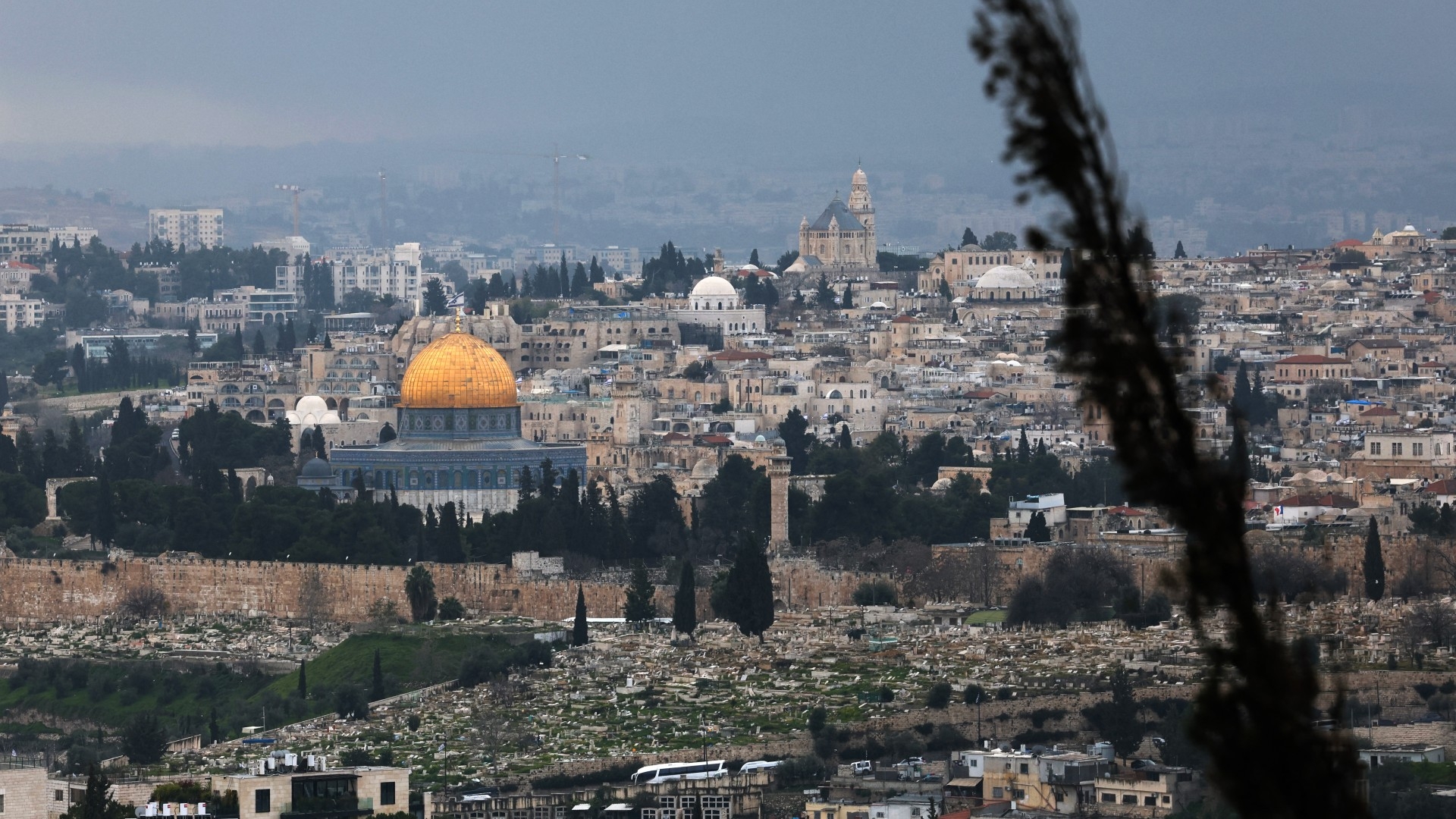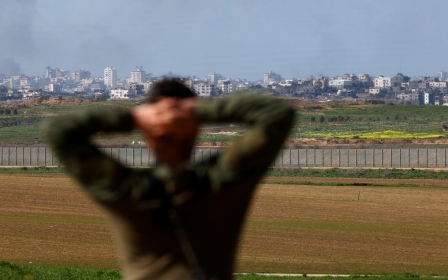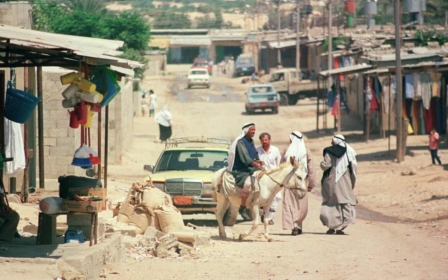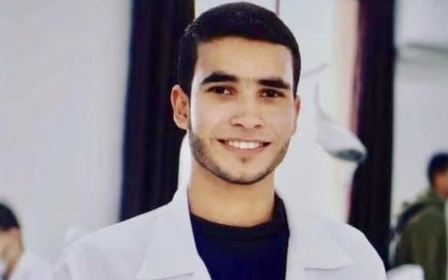Israel seeks to 'provoke' Palestinians by limiting Al-Aqsa entry during Ramadan

Israel's plans to restrict Palestinian Muslim worshippers access to al-Aqsa Mosque during the holy month of Ramadan is aimed at provoking the global Muslim community and prolonging Israel's military operations in Gaza, Palestinian political and religious figures have told Middle East Eye.
A proposal put forward by Itamar Ben Gvir, Israel's far-right national security minister, to limit the entry of Palestinian citizens of Israel into the mosque was accepted by Prime Minister Benjamin Netanyahu during a meeting with senior officials on Sunday, according to a Haaretz report.
The limitations will be based on criteria such as age and gender, the details of which are to be decided in the coming days.
Ben Gvir reportedly recommended that only Palestinian citizens of Israel above the age of 70 should be allowed into the mosque during Ramadan, while Israeli police recommended entry for those aged over 45.
The Shin Bet security agency opposed the decision and instead favoured unrestricted access for Palestinian citizens of Israel, a source at the meeting told Haaretz.
Ben Gvir also proposed a complete ban on Palestinians from the occupied West Bank worshipping at al-Aqsa during the month. No decision was made on those from the West Bank.
The far-right minister additionally proposed allowing Israeli police to raid al-Aqsa if Palestinian flags are waved or if worshippers "support terrorism", but the idea was rejected at Sunday's meeting.
Sami Abu Shehadeh, a former member of Israel's parliament, told Middle East Eye: "The first crime in my opinion is the linkage given to the month of Ramadan, that is a month of worshipping and fasting, with violence."
Abu Shehadeh, a Palestinian citizen of Israel, is the leader of the Balad party and was elected to parliament as part of the Joint Arab List bloc between 2019 and 2022.
"We have a historical experience of more than 1,400 years that did not involve any violence during Ramadan, but what changed?" he asked.
"What changed is the existence of this fascist right-wing government and its policies. Their attacks on worshippers and the people during this blessed month is what creates a nervous atmosphere."
Ramadan is due to begin on 10 March and will last either 29 or 30 days.
"Over the last few years, restrictions definitely happened," Sheikh Kamal al-Khatib, a prominent Palestinian religious figure in Israel, told MEE, citing the cutting off of loudspeakers and the closing of communal areas such as Damascus Gate.
"But for the situation to reach the announcement of a decision [limiting entry to al-Aqsa] a month prior to Ramadan, that of course represents a blatant religious war declared and conducted by Netanyahu’s government."
'It is a war on two billion Muslims, through targeting the third holiest mosque'
- Kamal al-Khatib, religious leader
During the holy month last year, Israeli forces used stun grenades and fired tear gas on worshippers at the mosque, before arresting hundreds of people.
And in May 2021, hundreds of Palestinians were injured after Israeli forces stormed the compound and attacked worshippers during Ramadan with tear gas, rubber-coated steel bullets and stun grenades.
The raids, as well as Israeli incursions in the occupied East Jerusalem neighbourhood of Sheikh Jarrah, sparked a major Israeli assault on the besieged Gaza Strip. At least 256 Palestinians were killed in Gaza, including 66 children.
Khatib said that Israeli security services have long warned that restrictions on access to al-Aqsa would be dangerous for Israel's security and its relationship with Arab countries in the region.
Last year's violent Israeli crackdown at the mosque was strongly condemned by Arab countries, including Saudi Arabia and Egypt.
'Two birds with one stone'
Abu Shehadeh said Netanyahu and Ben Gvir had an "interest in igniting the atmosphere".
"They work, consciously, on provoking the people, the worshippers and the Muslims in Jerusalem, inside of Israel, in the West Bank and the world," he added.
"Because the continuation of the war and the continuation of this state of violence serves Netanyahu’s interest to stay in power."
Khatib held a similar view, stating that restrictions would "hit two birds with one stone".
"As long as there is conflict and things are escalating, no elections will be held, therefore there will be no trial for Netanyahu, as so many Israelis are demanding these days," he said, referring to a string of corruption allegations against the prime minister.
"The second bird is, if the government manages to execute this decision, there is no doubt that it will be an advanced step towards imposing the temporal and spatial partition in Al Aqsa mosque," Khatib added.
Al-Aqsa Mosque is an Islamic site where unsolicited visits, prayers and rituals by non-Muslims are forbidden, according to decades-long international agreements.
But Israeli settler groups, in coordination with authorities, have long violated the delicate arrangement and facilitate raids of the site, and performed prayers and religious rituals.
Palestinians have described the development as "Judaisation" of the mosque. They fear that restrictions on their entry to the site is laying the groundwork for the mosque to be divided between Muslims and Jews, similar to how the Ibrahimi Mosque in Hebron was divided in the 1990s.
"The decision to prevent Muslims from entering Al-Aqsa Mosque is invalid and conflicts with freedom of worship," Ekrima Sabri, the former Grand Mufti of Jerusalem, said on Monday.
Khatib believes that Israeli actions related to al-Aqsa did not just target millions of Palestinians and Arabs.
"It is a war on two billion Muslims, through targeting the third holiest mosque [in the world]," he said.
Middle East Eye propose une couverture et une analyse indépendantes et incomparables du Moyen-Orient, de l’Afrique du Nord et d’autres régions du monde. Pour en savoir plus sur la reprise de ce contenu et les frais qui s’appliquent, veuillez remplir ce formulaire [en anglais]. Pour en savoir plus sur MEE, cliquez ici [en anglais].




